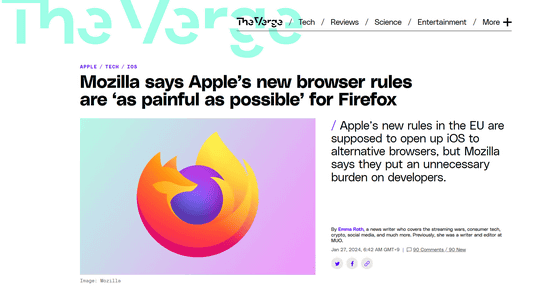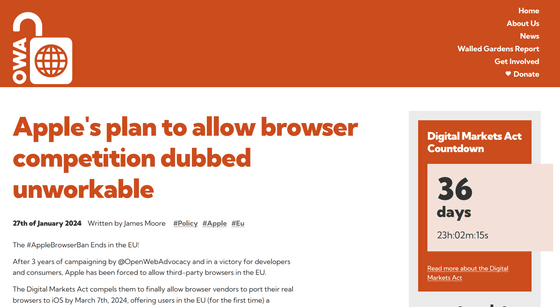Firefox developer Mozilla criticizes ``Apple's new rules allowing alternative browsers to impose as much pain as possible''

In order to comply with EU digital market law, Apple has announced new rules that allow third-party browser engines, changing from its previous stance of only allowing WebKit as the browser engine for iOS. However, Mozilla, which develops Firefox, claims that Apple's new rules place an unnecessary burden on developers.
Mozilla says Apple's new browser rules are 'as painful as possible' for Firefox - The Verge
https://www.theverge.com/2024/1/26/24052067/mozilla-apple-ios-browser-rules-firefox

Apple's plan to allow browser competition dubbed unworkable - Open Web Advocacy
https://open-web-advocacy.org/blog/apple-dma-changes/

The EU's Digital Markets Law is a law that recognizes giant IT companies that operate core platforms as 'gatekeepers' and imposes strict regulations on them, and came into effect in May 2023. The six companies designated as gatekeepers, Alphabet (Google's parent company), Apple, Amazon, ByteDance, Meta, and Microsoft, will be required to comply with the Digital Markets Act by March 6, 2024.
Seven major technology companies including Amazon, Apple, Google, and Microsoft admit to being ``gatekeepers'' under EU digital market law - GIGAZINE

In response to this, Apple has announced that it will allow browser engines other than WebKit from iOS 17.4, and will allow Firefox, Chrome, etc. to run on iOS with alternative browser engines other than WebKit only in the EU.
Apple finally allows full versions of Chrome and Firefox to run on iPhone - GIGAZINE

Firefox and Chrome have been released for iOS so far, but the browser engine was a version that adopted WebKit. Due to the introduction of new rules, it will be possible to run on iOS with its own browser engine from March 2024, although it is limited to the EU.
However, Mozilla spokesperson Damiano Demonte commented to the IT news site The Verge, ``We are extremely disappointed in the development of the situation.''
Apple says that the reason Apple has not allowed alternative browser engines such as Chromium and Gecko is to ensure the user's performance experience and activities performed on the web browser. In other words, Apple's argument is that completely allowing third-party browsers in web browsers that play a major role in online activities poses a security risk. Therefore, this move to allow alternative browser engines is strictly to comply with the EU's Digital Market Law, and we have not changed our stance of only allowing WebKit outside the EU.
The fact that Apple only allows alternative browser engines within the EU means that from the Mozilla side, which develops Firefox, ``we have to maintain two types of Firefox for iOS at the same time: the WebKit version of Firefox and the Gecko version of Firefox.'' It will be. 'The new rules will force independent browsers like Firefox to build and maintain two different browser implementations, a burden that Apple itself will not have to shoulder,' Demonte said. states

``Apple's proposal imposes as much pain as possible on other competing browser alternatives to Safari and fails to provide consumers with a viable option,'' Demonte said. strongly criticizes the attitude of
Open Web Advocacy, a group of software engineers aiming for the future of the open web, echoes DeMonte's sentiments and criticizes Apple, but says, ``Apple's finally taking a stand with the Digital Markets Act is an important step.'' He commented that he would like to allow all users to choose their own web browser in the future.
Related Posts:






